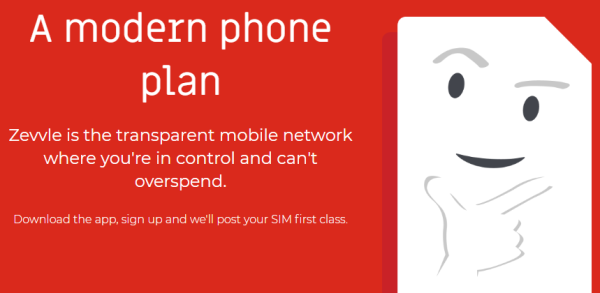Zevvle interview (part 2)

If you haven’t already seen it, check out the first part of our interview with Zevvle, a new network hoping to shake up the MVNO market.
We’re back with their co-founder, the creative wacky Nick Goodall, chat a bit more about the new network.
Hi again Nick. It’s clear that being transparent and running a pay-for-only-what-you-use model is important to you, but are other MVNOs offering better value on their monthly bundles? How can they afford this and why is your offering superior?
The ‘better value’ depends where you’re standing. 10GB for £12 is great if you use 10GB. But that’s rarely the case; according to Citizens Advice, over 12 million SIM only customers are wasting an average of £63/year on unused contracts, totaling £800m/year. That incentive alignment is messed up as well – the more you waste, the better for them.
So what’s the uptake been like so far? What are your growth plans and forecasts?
Better than planned to be honest; we’re aiming for 10% week-on-week growth, but have done 12% since launch.
Where did the share idea come from and how successful has it been? Or was it just a cheap/bootstrap way of incentivising customer acquisition?
It was Tim’s idea, and I was immediately hooked. All our growth so far is word of mouth, and it’s not like we have 100’s of thousands of people waiting (our share price is hardly anything to write home about).
And quite the opposite of something cheap; we hope it’ll become one of the more valuable referral programs around. Considering the fervor with which founders hold onto their stock, it’s nice to do something different. A free £5 bonus or whatever is fleeting, whereas a part of Zevvle isn’t.
Why in particular did you choose to work with EE in the UK?
Mostly because of our direct supplier, Transatel (an MVNE behind Plusnet, The Phone Co-op and China Telecom), who met our requirements for launching. Having the fastest network with the best coverage (on average) is a bonus.
What was the reasoning behind the subscription model?
To cover the cost of the SIM + multiple SIMs. We’ve now decided to field the cost of the first SIM and then charge a fixed rate for additional SIMs.
Can you explain more about the decision to use a post-pay system?
If you mean post-pay on the backend, it comes down to a) cost and b) ease of setup. We were able to launch relatively cheaply & quickly, whereas the traditional pre-pay model is a lot more involved.
Why do you think so many people are stuck on expensive PAYG plans when there are so many cheap alternatives available now? What’s the main thing holding people back from switching?
How many are still using true PAYG I don’t know, as most of them seem to offer “bolt-ons” effectively turning them into PAYM. If you use your phone once every 3 months, PAYG is still great, but with our £5/month minimum we don’t really cater for that use-case…
Why are calls and texts still so expensive in 2019 and is there any scope for movement on your pricing especially in the future if wholesale data pricing finally comes down?
Re. being expensive, it’s because they still use the old technology, instead of the internet. It’s slowly starting to change, but with money on the line there’s understandably inertia. Yes, hopefully our pricing will come down and we can pass that saving onto customers. The eventual goal is to make it all internet-based anyway, and maybe even bridge into something like Matrix.
Finally, where do you see the network in five years?
Our rough plan is 1) launch & grow, 2) connect directly to a network host, 3) expand internationally and 4) become one of the first networks on Mars. In 5 years I hope we’ll be somewhere around # 3.
Thanks Nick for spending the time with us and please let us know in the comments below what you think about Zevvle.




Recent Comments